Which side are you on? Solidarity as Spiritual Practice
Outgoing Executive Director Michael Ramos reflects on May Day 2023
Solidarity with workers has been a hallmark of the Church Council of Greater Seattle over the last 40 years. This “taking of sides” has been most frequently expressed in the coming alongside of Black, Indigenous and People of Color workers. In so doing, the community of faith has contributed to a movement, led by workers struggling for living wages and respect on the job, for a counter-narrative to the dominant culture which glorifies corporate greed and competition, profits over people, and eschews the right to organize. Attacks on unionization efforts are not new; however, our social distance from people who put food on our tables, clean our buildings, care for our relatives, attend to us in hospitals, labor in construction, and watch young children has grown over time. Solidarity repairs the breach between the comfortable and those who have been oppressed while employed in the context of unjust economic systems.
Solidarity, to be effective, must be anti-racist in nature. The economic engine of the United States was built on Black and Native labor, under the most brutal of systemic dehumanization. Solidarity means fighting for reparation in terms of land, resources, education, opportunity, and investment.
The same economic engine that enslaved African people and stole land from Indigenous communities impacts immigrant workers today. An undocumented young farmworker, a mother, who I had met in Eastern Washington, spoke years ago to the power-brokers in Olympia: “look at the fields, the sweat, the tears; what we need is an amnesty so that our families, our children might not be so vulnerable.” Twenty years ago, under the fiscal sponsorship of the Church Council and working with dozens of community organizations, I coordinated the Seattle bus for the Immigrant Workers Freedom Ride, 42 people from 20 countries and 14 languages crossing the United States over 13 days to New York and Washington, D.C. The riders spoke to the need for a pathway to citizenship, family reunification, justice on the job and due process, the principles of Comprehensive Immigration Reform. On May 1, 2023, we are still organizing and advocating for a just reform.
As I continue to see a spirit of resistance in workers, whether immigrant workers, workers organizing to be treated with dignity and respect, and workers with multiple jobs trying to earn their daily bread to support their families, I remain steadfast in hope for their future through the bridge-building of solidarity for collective liberation.
A Unitarian minister, Tim DeChristopher, wrote in the context of the work for climate justice:
In those dark moments we continue to struggle for justice, because that is what it means to be faithful to the people we love, to be faithful to the world we love, and to be faithful to a God who loves the world. Reconnecting and reaffirming those loves is the critical work of moral leadership in this movement. As much as we need to fully recognize the harsh truth of the nature of our challenge, we must just as fully affirm with gratitude the goodness and beauty that we love in the world, in God and each other. Our faithfulness to this love becomes the bedrock of a more resilient kind of hope, a hope that doesn’t bend to the winds of political feasibility.*
Inspired by workers who aspire to joy-filled human flourishing through suffering, sacrifice, cross-sectoral community-building, and organizing, let us not desist from engaging the struggle in whatever way we can. This freedom journey is fundamentally life-affirming and life-changing. It has been for me. Relationships built on a foundation of equity and following the lead of impacted community members contribute to the dynamism necessary to transform domination systems toward a world where healing and thriving are possible. Together, we are ambassadors for change.
I leave the Church Council remembering the words of the great Cesar Chavez of the United Farm Workers: “When we are really honest with ourselves, we must admit that our lives are all that really belong to us. So it is how we use our lives that determines what kind of people we are. It is my deepest belief that only by giving of our lives do we find life.” I am grateful to each of you for encouraging and challenging me to grow and for offering your robust solidarity that takes the side of working people. May we all partake of the harvest of justice that looms on the horizon.
*Harvard Divinity Bulletin, Winter/Spring 2015 (Vol. 43, Nos. 1 & 2)


